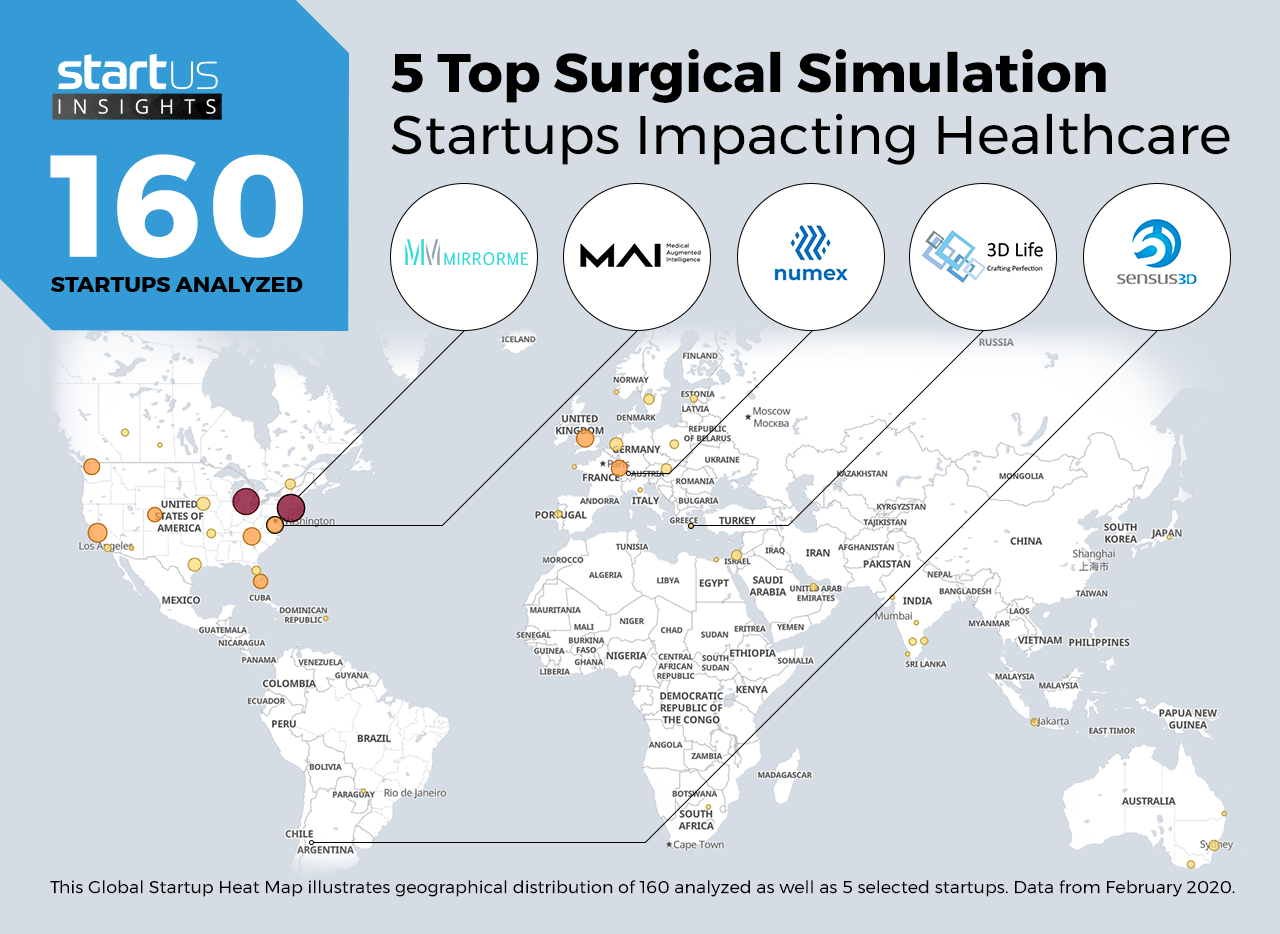Our Innovation Analysts recently looked into emerging technologies and up-and-coming startups working on solutions for the healthcare industry. As there are a lot of startups working on various different applications, we want to share our insights with you. Today, we take a look at promising surgical simulation startups.
Heat Map: 5 Top Surgical Simulation Startups
For our 5 top picks, we used a data-driven startup scouting approach to identify the most relevant solutions globally. The Global Startup Heat Map below highlights 5 interesting examples out of 160 relevant solutions. Depending on your specific needs, your top picks might look entirely different.
MirrorMe3D – Plastic Surgery
Reconstructive or plastic surgery has applications in wound management, neoplasia, and aesthetics. 3D printing provides more accurate reference tools for plastic surgery. Among other factors, the success of an implant depends on the correct understanding of the anatomy of the region to be reconstructed. Simulations help surgeons interactively understand patient-specific anatomy.
The US-based startup MirrorMe3D develops simulation solutions for plastic or reconstructive surgery. The software generates anatomically accurate pre-operative patient profiles and simulates post-operative conditions. Their tool finds implementations in periorbital, rhinoplasty, and conjoined twins surgeries.
MAI – Patient Education
Patient engagement is a crucial element of pre-operative procedures. It educates the patient about why the surgery is needed and what to expect after it. Medical scans can be daunting to the layman and don’t necessarily improve patient confidence. Looking at organs in virtual reality is a more engaging alternative.
The US-based startup Medical Augmented Intelligence (MAI) develops virtual reality-based solutions for the healthcare industry. Their technology, DigiTwin, converts patient medical scans into 3D virtual images. Patients gain insights from their digital twins and are more informed about their treatment plans.
Numex – Surgical Planning
Before surgery, doctors look at diagnostic images such as MRIs or CT scans. With advancements in imaging technology, it is now possible to reconstruct the three dimensional (3D) morphology from these images. This allows surgeons to personalize surgeries for each patient. Thus, the interventions are precise and outcomes more reproducible.
The Swiss startup Numex develops simulation software for planning surgeries. Their software develops a patient-specific, three dimensional (3D) model that visualizes bones, cartilage, and soft tissues. It allows surgeons to virtually plan orthopedic surgeries such as resections, osteotomies, and arthroplasties.
3D Life – 3D Printed Organs
Damaged organs are all different depending on the patient and the extent of the disease. Even experienced surgeons may overlook an important detail, which could lead to complications during or after surgery. 3D printed models, however, illustrate pathology and anatomy that may not be evident from conventional scans.
The Greek startup 3D Life develops three-dimensional anatomic models of internal organs. They offer 3D printed models of the heart, cranial plate, bones, and more. 3D Life has a vast library of heart models for various conditions that help surgeons make better choices and improve the safety and efficacy of surgery.
Sensus3D – Surgery Training
Since surgery is an incredibly complex skill, training surgeons is a very expensive and time-consuming affair. Moreover, letting trainee surgeons operate on real patients poses risks. To make matters more challenging, the traditional model of assessment by senior mentors is very subjective as well. Simulations, however, offer a safer and objective alternative to train and assess surgeons (to-be).
Sensus3D is an Argentina-based startup developing low-cost simulators for sophisticated, surgical skills. It combines haptic feedback and virtual reality (VR) to simulate surgical actions such as suturing and cauterization. The startup develops products to train surgeons in working with breast and dental implants too.
What About The Other 155 Solutions?
While we believe data is key to creating insights it can be easy to be overwhelmed by it. Our ambition is to create a comprehensive overview and provide actionable innovation intelligence for your Proof of Concept (PoC), partnership, or investment targets. The 5 surgical simulation startups showcased above are promising examples out of 160 we analyzed for this article. To identify the most relevant solutions based on your specific criteria and collaboration strategy, get in touch.


![AI in Healthcare: A Strategic Guide for Industry Leaders [2025-2030]](https://www.startus-insights.com/wp-content/uploads/2025/03/AI-in-Healthcare-SharedImg-StartUs-Insights-noresize-420x236.webp)






